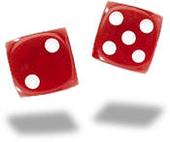Dice (the plural of die, from Old French de, from Latin datum "something given or played" [1]) are small polyhedral objects, usually cubical, used for generating random numbers or other symbols. This makes dice suitable as gambling devices, especially for craps or sic bo, or for use in non-gambling tabletop games.Traditionally, a die is seldom seen alone, and is rather one of a pair of identical dice that are sized to be comfortably rolled or thrown, together, from a user's hand. Because of this, the singular word "die" is rare, but treating "dice" as interchangeably singular or plural is less common.A traditional die is a cube (often with corners slightly rounded), marked on each of its six faces with a different number of circular patches or pits called pips. All of these pips have the same appearance within a pair, or larger set of dice, and are sized for ease of recognizing the pattern the pips on one face form. The design as a whole is aimed at each die providing one randomly determined integer, in the range from one to six, with each of those values being equally likely.More generally, a variety of analogous devices are often described as dice, but necessarily in a context, or with a word or two preceding "die" or "dice", that avoids the assumption that traditional dice are intended. Such specialized dice may have cubical or other polyhedral shapes, with faces marked with various collections of symbols, and be used to produce other random results than one through six. There are also "loaded" or "crooked" dice (especially otherwise traditional ones), meant to produce skewed or even predictable results, for purposes of deception or amusement.
This profile was edited with getgreatcodes.com Editor
